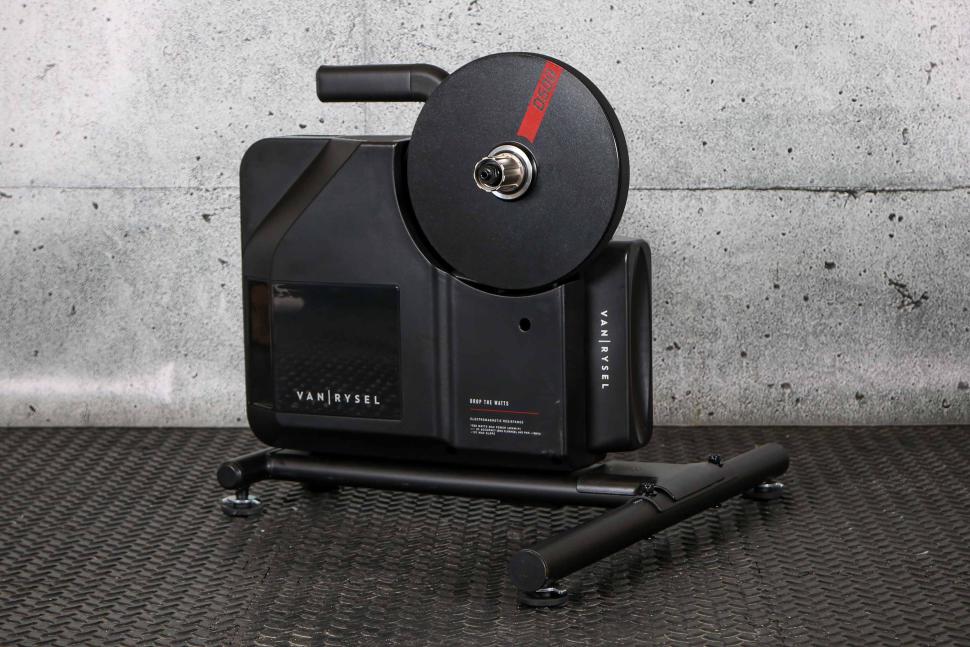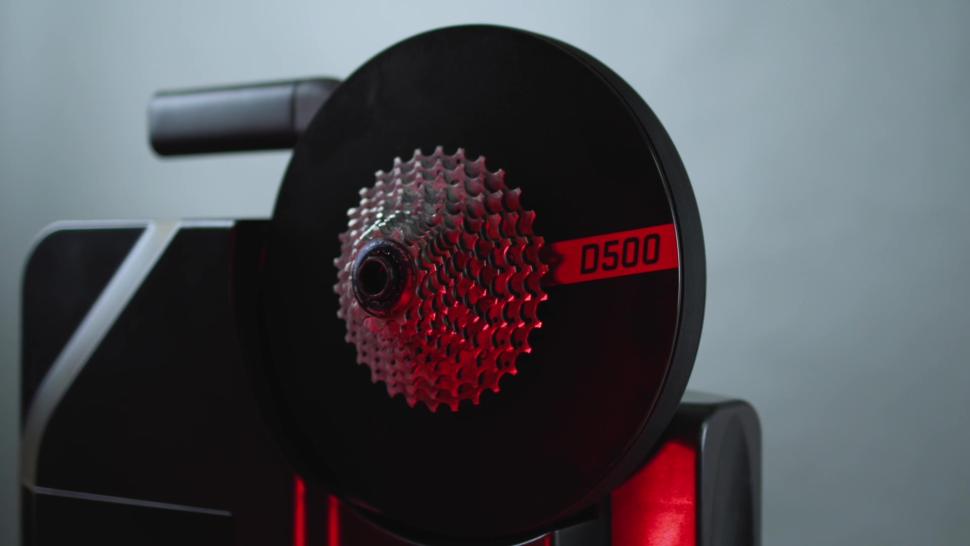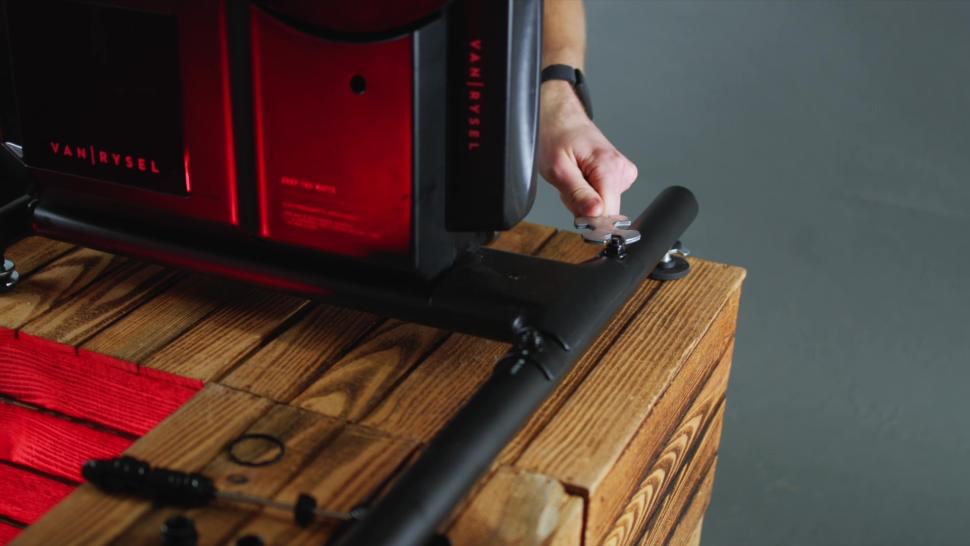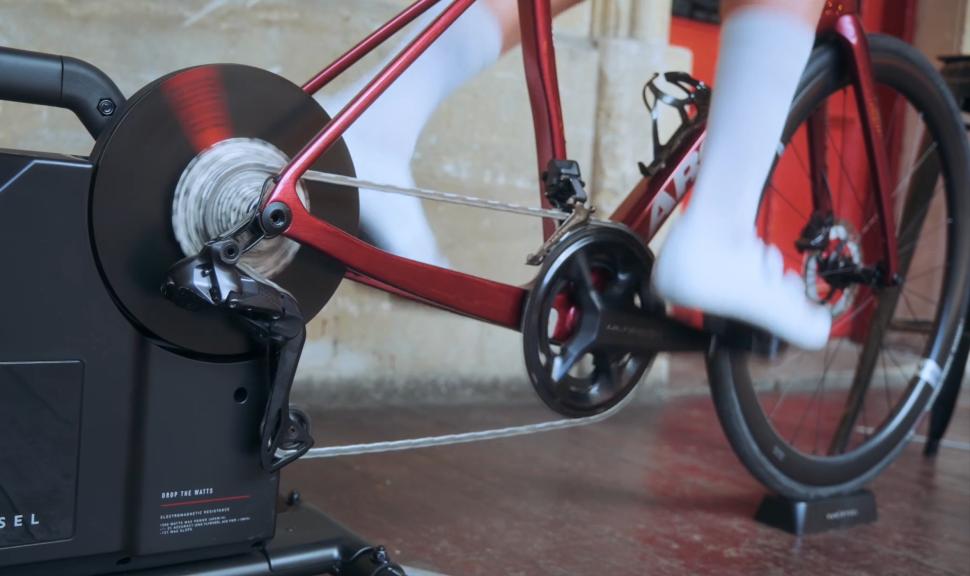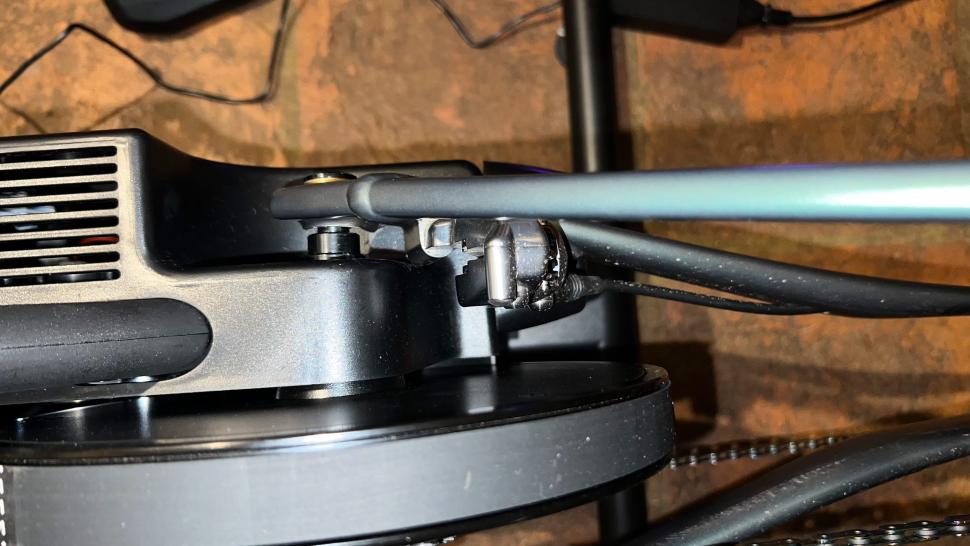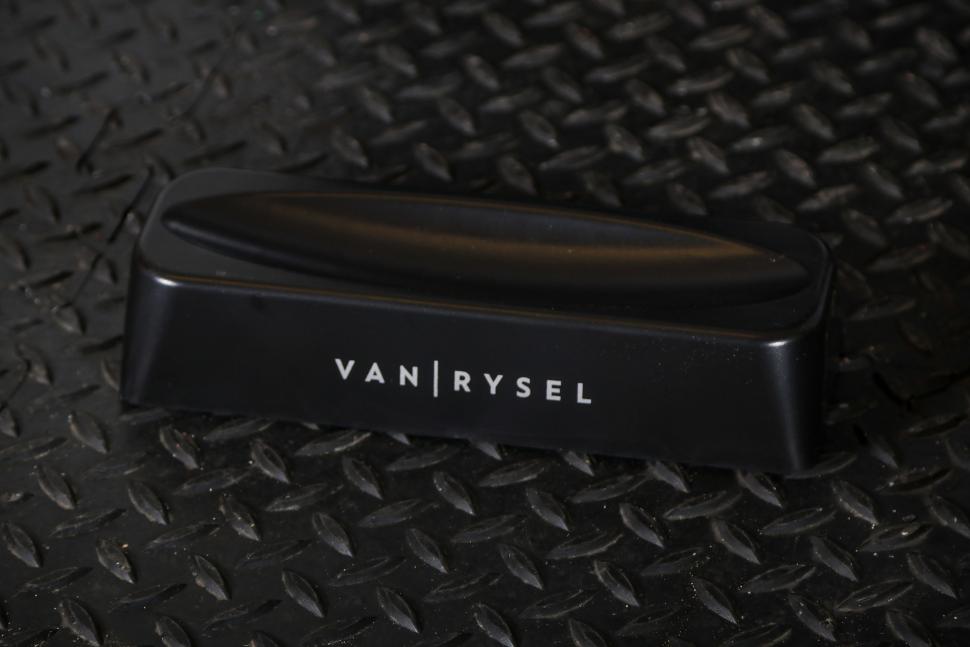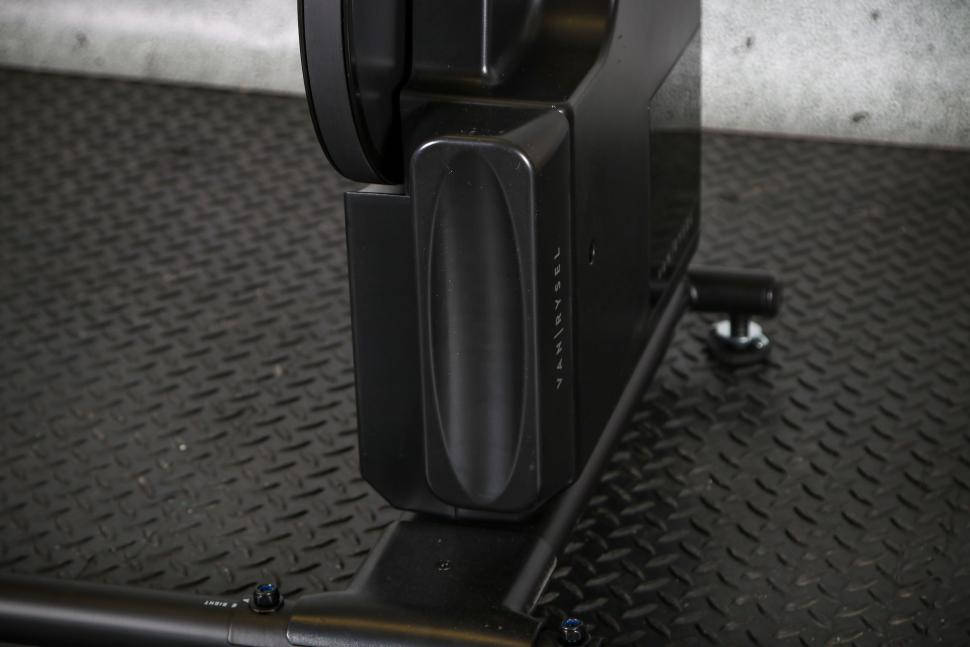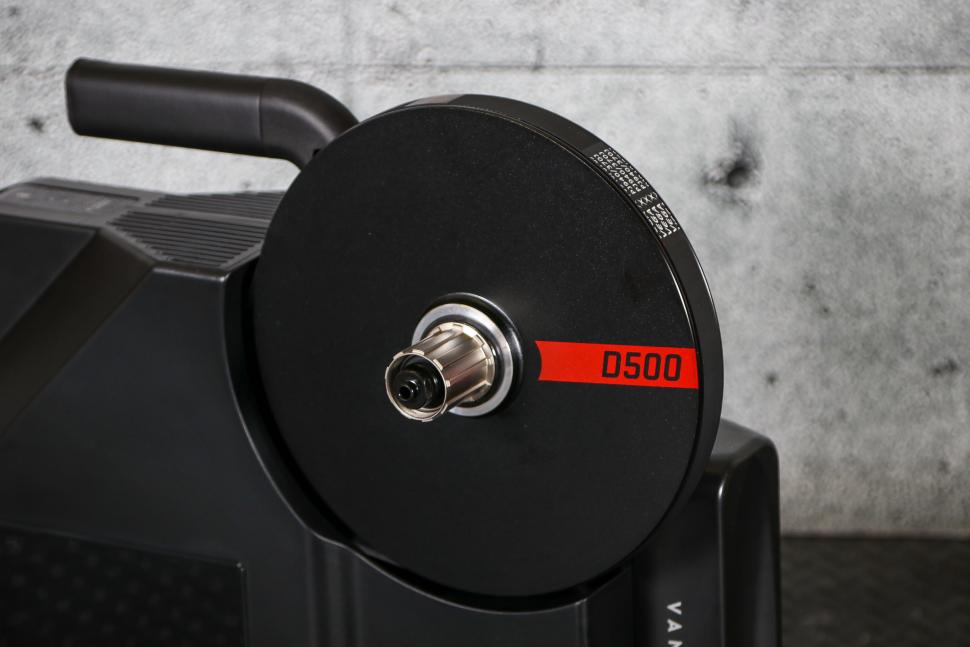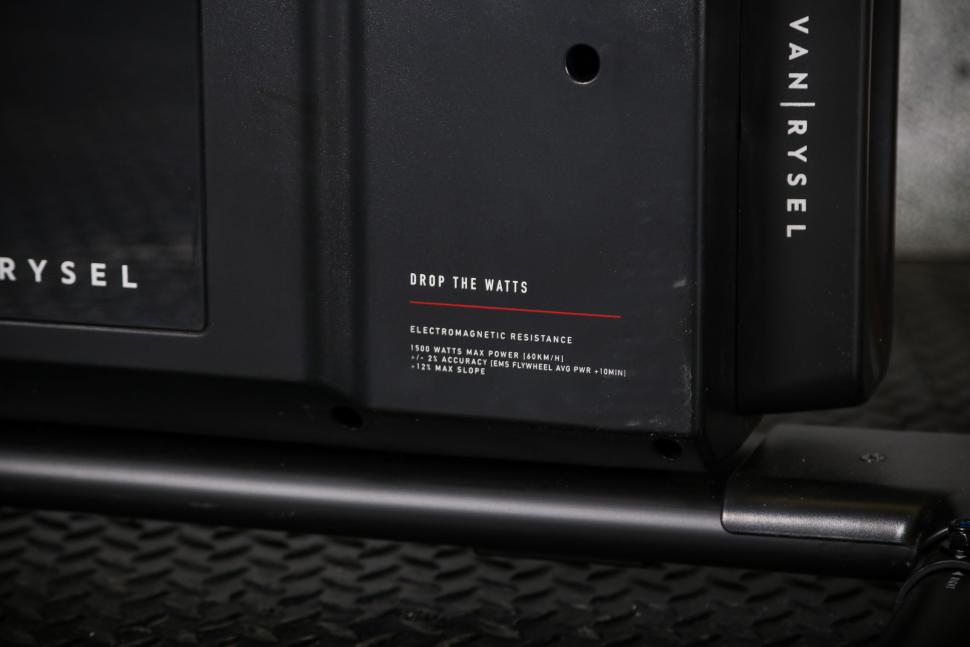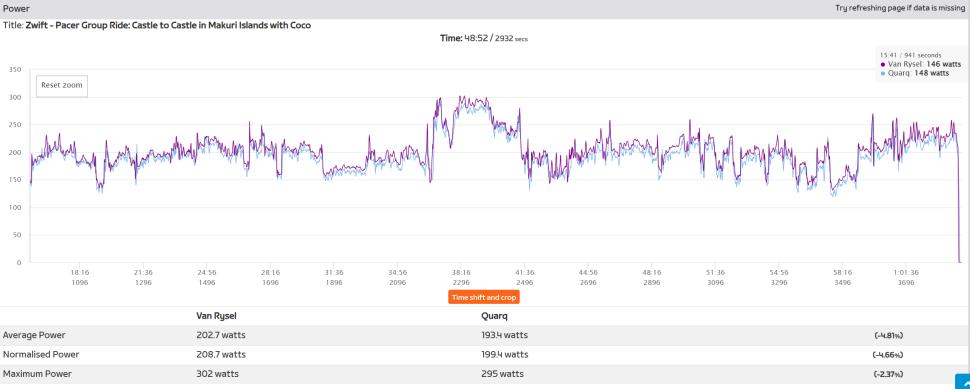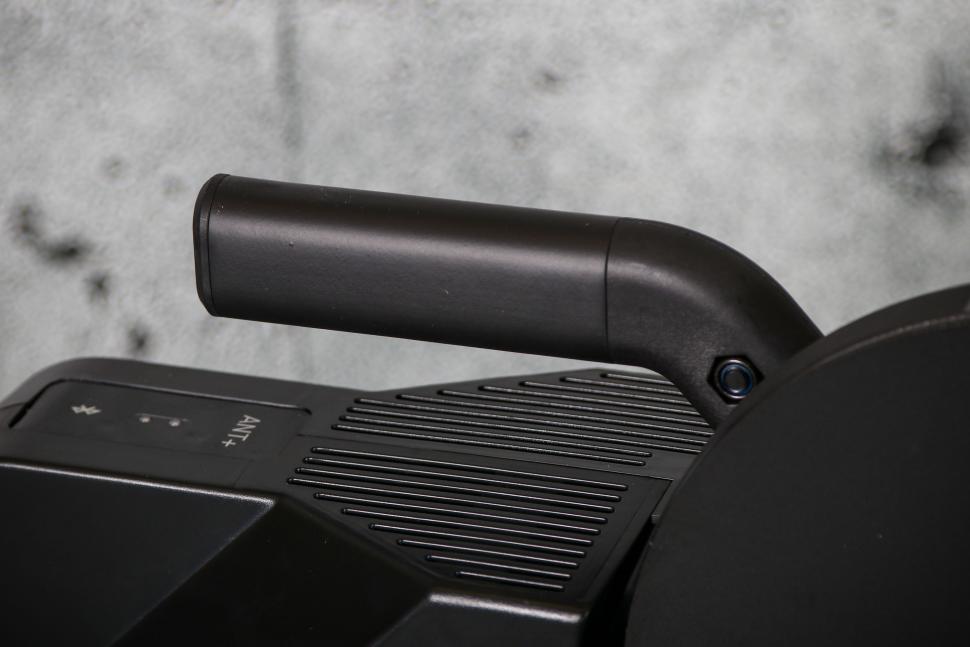The Van Rysel D500 turbo trainer promises to reduce the price of direct-drive smart training without compromising on specs. It’s quiet, stable and provides more than enough resistance for high-power sprints, but despite its competitive price, it falls short compared with the more established competition.
For more options, check out our guide to the best turbo trainers.
The D500 differs from most of our reviews in that we actually went out and spent our own money on one. Usually, brands are only too happy to send us their latest and greatest products to review but for whatever reason Decathlon declined our request. Undeterred, we went out and bought one, because from the stat sheet alone it looks as though it could be capable of overthrowing the heavyweights in the category, those being the Wahoo Kickr Core and Zwift Hub One (which has now been discontinued).
Undoubtedly the most appealing feature of the D500 is the price, £449.99, which until recently seriously undercut the Wahoo Kickr Core. Admittedly that is still a lot of money, but the Kickr Core has proved that you can get uncompromising direct-drive smart training for less than half the price of the top-tier options; the Van Rysel D500 aims to take that one step further.
It’s worth noting that you also need to factor in the cost of a cassette with the D500 as, unlike the Kickr Core, it doesn’t ship with one. This will likely add around £25 to the bill.
Despite this, it’s hard to knock the D500 on price, especially given its stats: 1,500 watts max resistance, max gradient 12%, 4.7kg flywheel weight and a claimed power recording accuracy of +/-2%.
Setting it up
Of course, before doing any riding you need to set the thing up. A task that’s put off many a budding indoor cyclist. The D500 does require some assembly, but don’t fear, this isn’t divorce level like flat-pack furniture.
The front leg is attached using two bolts and a tool is supplied. You’ll also need to fit the cassette, a job that is commonplace but does require specialist tools.
The set-up process should by no means be offputting, but Zwift in particular has gone to significant effort with its tutorial videos, colour-coded parts and now one sprocket cassette to set itself above the competition – it’s still ahead.
I had the D500 ready to roll in just over 10 minutes. Next job, put the bike on and calibrate…
Putting a bike on
Like with any direct-drive trainer, you remove the back wheel of your bike and then lower the bike onto the turbo. You then secure the bike to the turbo using either the thru-axle or quick-release skewer that you usually use on your bike.
On the Decathlon website it states that the D500 is compatible with quick-release (130-135 x 5mm) and thru-axle bikes (142-148 x 12mm), excluding the Cervelo P5 and Cube Attain, so chances are your current bike should be compatible. You simply need to pick out the right adaptors from the box and you’re good to go. Hmm.
I fitted my Specialized Tarmac SL7 with no issues, but when I tried to fit a Specialized Allez Sprint I ran into my first issue: there was simply no way it was going on because the rear brake calliper mount hit the body of the turbo.
I’ve since tried to fit all manner of review bikes that we’ve had here at road.cc HQ, and have come to the conclusion that every rim brake bike I’ve tried will fit, and nearly all the carbon disc brake bikes (although some did touch), but I’ve had less luck with aluminium disc brake bikes, which usually have larger brake mounts. Depending on your bike this could be an absolute deal-breaker. It’s certainly safe to say that it’s not just the Cervelo P5 and Cube Attain that are the incompatible exceptions.
It’s also worth highlighting that while the turbo is compatible with 8-12-speed bikes, the SRAM XDR freehub is currently out of stock, and has been for the majority of the year.
If you have managed to fit your bike by this point then you can slide the provided wheel riser block under your front wheel.
When not in use it’s stored on the front of the turbo using magnets.
The riser block would benefit from some rubber feet to prevent it from sliding on hard floors.
Calibration
Before getting into any serious training it’s necessary to calibrate the turbo trainer to ensure it’s reading your watts to the best of its abilities. This cannot be done in my training platform of choice, Zwift (unlike the Kickr range), so you’ll need to download the OnelapFit phone app. Some consistent riding to warm up the turbo and two account creations later, and my trainer was connected and calibrated.
This was a stress-free process but did incur additional faff compared with Van Rysel’s chief competition.
In use
Time for some actual riding! Whether you’re using the D500 for an interval session, an online race or just a virtual spin, this trainer doesn’t feel like the cheap option. It’s stable when sprinting, responsive to virtual gradient changes and the flywheel is weighty enough to give that sense of realism to your pedalling action.
The maximum resistance figure of 1,500 watts might be shy of the 1,800W resistance that the Zwift Hub One and Wahoo Kickr Core can provide, but it easily outperforms most wheel-on trainers. The Tacx Flow, for example, only provides 800 watts. During testing, try as I might, I wasn’t able to trouble this 1,500W figure even during max sprints – and I’d hazard that it’s highly unlikely you’ll be able to either!
That resistance capability also means the D500 can simulate virtual climbs up to 12%, so it’s unlikely you’ll find many virtual climbs on indoor apps where you could max out with this trainer, especially if you’re using default difficulty settings.
Of course, being direct drive there’s also no chance of wheel/tyre slip on a roller, so you can focus fully on getting that power down.
Power accuracy
There are two parts to power measurement: accuracy – as in how far from the real figure the trainer reads – and reliability, which is how consistent that figure is. Let’s start with the claimed accuracies.
Van Rysel claims the D500 can measure to an accuracy of +/-2% which is strong compared with competition at this price point – the Wahoo Kickr Core, for example, has an identical claimed accuracy but the Pinnacle HC Trainer has a claimed accuracy of +/-2.5%, and the identically priced Elite Zumo higher at +/-3%.
Even though there are (more expensive) trainers out there that can measure to +/-1%, for the majority of us our money is well placed with something of this accuracy. In fact, unless you’re doing elite-level virtual racing there’s hardly any point in getting a more accurate power measurement. After all, it’s at least as accurate as a lot of the power meters you’d use out on the road.
However, it’s the reliability of these figures that has been the downfall of many a turbo. To test the reliability of the figures, I’ve spent the last few months benchmarking the D500 against known power meters.
I was initially very impressed with the Van Rysel D500 – the numbers seemed bang on the money, the readings are reactive to surges, and short sprints were tracking with my crank-based and pedal-based power meters. However, as training sessions continued, either I was getting stronger by the second or something dodgy was going on. Unfortunately, the data from my on-bike power meter revealed that it was the latter (shown above).
When you start riding, the D500 measures well within the claimed accuracy. However, as the trainer begins to heat up the number drifts away from what my Quarq and indeed other power meters have measured. Nerdy people call this thermal drift, and it’s where power meters rely heavily on resistance, which is dependent on temperature.
This is an area seemingly very hard for turbo trainer manufacturers to master, but, unfortunately for Van Rysel, master it Tacx, Wahoo and Elite have. The problem isn’t so bad that I would completely write off the D500, because it’s still functional and the scale of the problem is far, far less than on some other trainers I’ve used. But it’s an area where the Wahoo Kickr Core, for example, is clearly leading the way.
When you’re done
We’re not all fortunate enough to be able to leave a turbo trainer set up with a bike on it, and so many trainers fold for storage. The Van Rysel doesn’t fold, but it does have a carry handle, which definitely makes it far easier to carry around the house than many turbos at this price; you usually have to spend a lot more money on a trainer before they give you a handle…
Value for money
On paper, compared with many direct-drive trainers, the D500 stacks up well on the price front, though the Wahoo Kickr Core (with or without the Zwift hub) has recently been discounted to £449.99 and does have the added benefit of coming with a cassette.
The Elite Zumo also has an identical price tag, but with a claimed accuracy of +/-3% and a maximum resistance of 1,200W, it gets beaten on the spec sheet at least by the Van Rysel.
The D500, then, is well equipped for its price tag, and feels good during use, but it’s let down by that power drift as it gets hot, which despite MANY calibrations and software updates I’m yet to fix.
Conclusion
The D500 looked set to give the likes of Wahoo and Zwift something to think about, and there is a lot to like – the resistance, setup and riding performance are bang on the money – but the power reading reliability issues I’ve had mean I’ll be sticking with the Wahoo Kickr Core for another season yet.
Over the last few years I’ve been thoroughly impressed with Van Rysel’s ability to bring performance at a price point that undercuts the competition, for example with their bikes, shoes, helmets and glasses. Unfortunately the D500 doesn’t join that list, but with some minor updates it could be right up there competing with the best.
Verdict
Strong specs and an attractive price, but not without its faults
Make and model: Van Rysel Interactive Turbo Trainer D500
Tell us what the product is for and who it’s aimed at. What do the manufacturers say about it? How does that compare to your own feelings about it?
Decathlon says: “With the D500, you can enjoy incredibly realistic virtual rides thanks to the smooth pedalling motion, max power of 1500 watts and hill simulation of up to 12%.”
The D500 is well specced for the price and does feel good in use. However, the bike compatibility and power drift as it heats up let it down.
Tell us some more about the technical aspects of the product?
From Decathlon:
communication protocols ant+, bluetooth
connected smart interactiv
maximal power (in watts) power > 1000 Watts
resistance-type electromagnetic resistance
measurement accuracy > 2%
turbo trainer technology direct drive trainer
incline simulation angle 12%
descent simulation without mechanical descent simulation
Composition
Motor: 10.0% PCBA, 20.0% Magnet, 70.0% Stainless Steel
Carcass: 100.0% Acrylonitrile Butadiene Styrene
Frame: 100.0% Stainless Steel
Rate the product for quality of construction:
8/10
Rate the product for performance:
5/10
In many respects the performance of the D500 is right up there with the best in this category, but it’s let down by the power drift as it heats up – and certain bikes not being compatible. This brings a potential score for performance of 8 down to a 5; it’s not bad, just average.
Rate the product for durability:
8/10
Rate the product for weight (if applicable)
8/10
Rate the product for comfort (if applicable)
8/10
Rate the product for value:
5/10
It’s good value on paper, compared with some, but this is undermined by the power drift, and the fact that not all bikes will fit.
Tell us how the product performed overall when used for its designed purpose
It performed well, as well as the best, in some respects – apart from the power drift as it heated up (though still a lot less than some trainers I’ve used).
Tell us what you particularly liked about the product
It’s responsive to ride and there’s more than enough resistance and flywheel weight to make riding feel natural.
Tell us what you particularly disliked about the product
The power drift as it heats up.
How does the price compare to that of similar products in the market, including ones recently tested on road.cc?
Direct-drive trainers have been coming down in price recently, and it has the identically priced Elite Zumo beaten on specs and is the same price as the Kickr Core, though that comes with a cassette. It’s cheaper than Tacx’s direct-drive offerings.
Did you enjoy using the product? Yes
Would you consider buying the product? Not at RRP.
Would you recommend the product to a friend? Not at RRP.
Use this box to explain your overall score
The price, specs and user experience are right up there with the class leaders, but unfortunately the reliability of the power measurement lets it down, and it doesn’t ship with a cassette. Oh, and one of my bikes wouldn’t fit on it…
Age: 23
I usually ride: Specialized venge pro 2019 My best bike is:
I’ve been riding for: Under 5 years I ride: Every day I would class myself as: Expert
I regularly do the following types of riding: road racing, time trialling, cyclo cross, commuting, club rides, sportives, general fitness riding, mtb,

